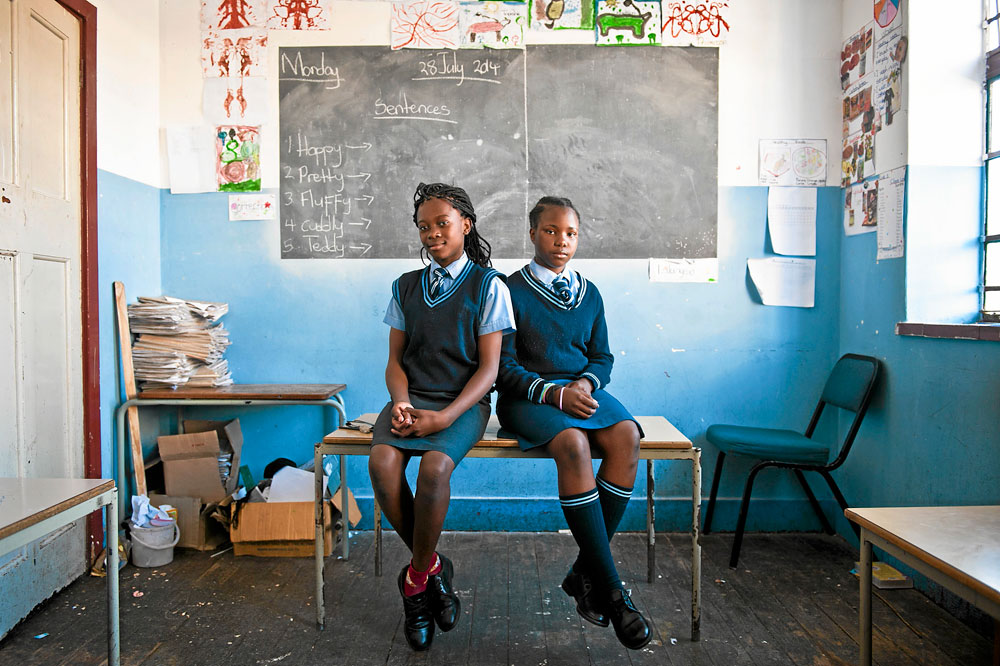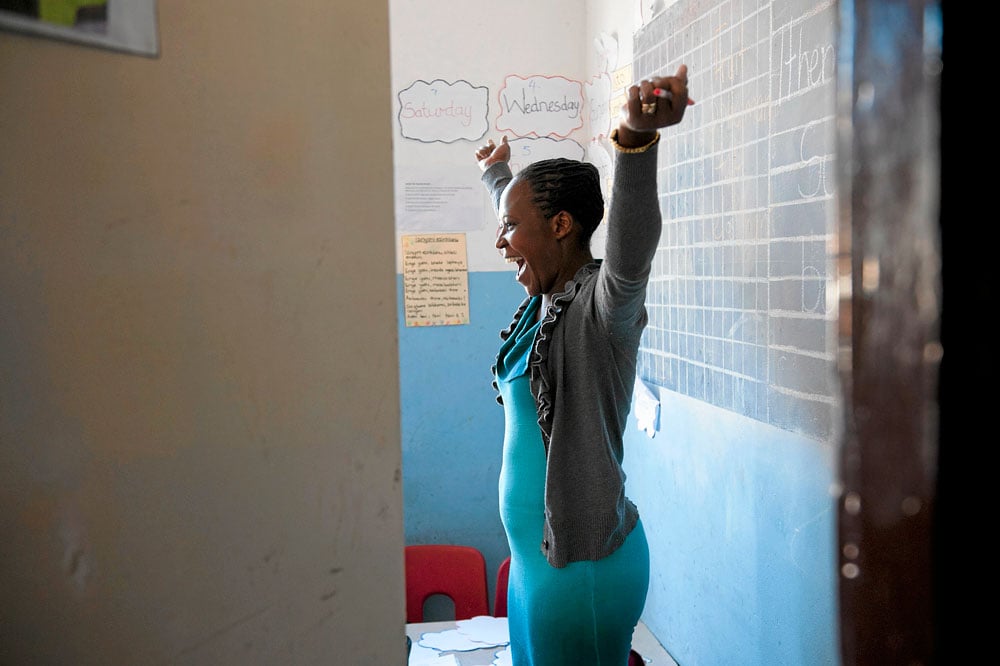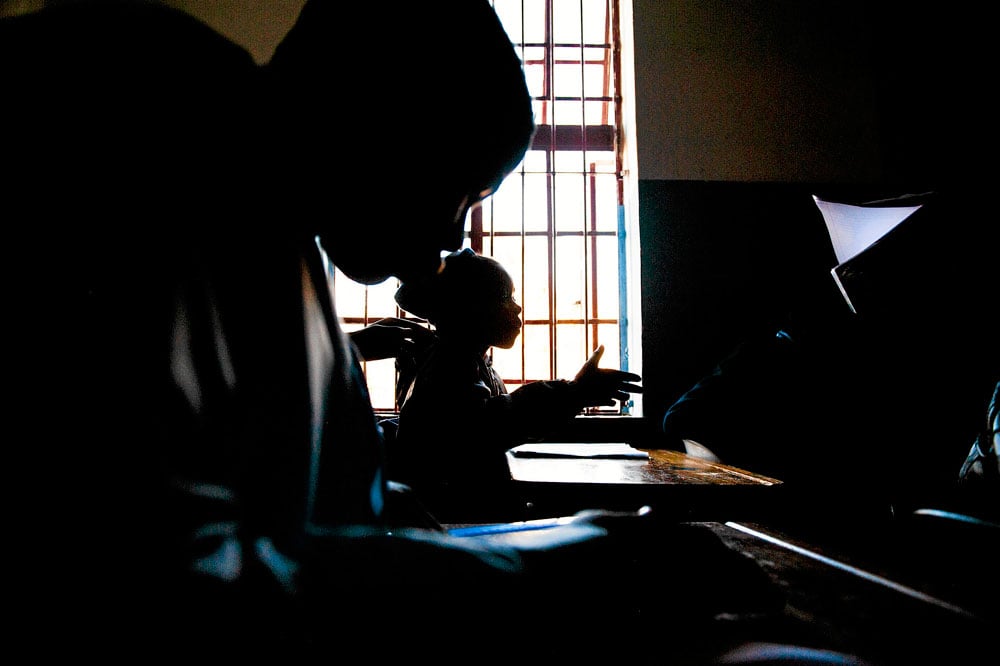Judy Manjoro (49) is a teacher, but when she fled Zimbabwe in 2005 during political violence and came to South Africa, she was forced to become a domestic worker because there was no other work available.
In the afternoons when she returned to her home in Yeoville, Johannesburg, she would gather the children of other refugees off the streets and give them lessons.
In 2011 she formalised this arrangement and started a school for refugee children in her suburb. It now has 180 pupils from Burundi, Kenya, Zimbabwe, the Democratic Republic of Congo (DRC), Nigeria and South Africa, as well as nine teachers and three support staff.
I first met Manjoro at a conference three years ago, a few months after she had started her school. I mentioned her in a story I wrote and a nongovernmental organisation called School Aid gave her books, stationery and furniture.
This year I got in touch with School Aid again. Manjoro had been in jail, they told me. Two weeks ago I went to visit her.
It’s Monday mid-morning but music blares out of the shebeen in Yeoville. Its patrons don’t want to be in our photographs.
Across the road on the pavement, a woman’s hair is being braided. Hawkers sell chips, fish and phone chargers amid fumes from taxis, police trucks and delivery vans.
Behind the hawkers is the entrance to the double-storey iThemba Study Centre, the refugee children’s school.
Up the stairs you can hear the sound of teaching coming from the classrooms. In the grade two class, a boy sings a line from a pop song: “These hoes ain’t loyal …”
Manjoro, now the school manager, welcomes us into the principal’s office. She is a dignified woman, neatly dressed in a black polo-neck top and a checked coat. She calmly tells her story, punctuated with a hearty laugh, even when she is talking about the really tough times. In Manjoro’s world the focus is always on the positives.
“I taught them because I couldn’t not teach,” she says, recounting the roots of the refugee school. “How could I just sit at home? I couldn’t.”

Lessons in persistence: Divine Ngamwa and Nomagugu Ndlovu are pupils at iThemba Study Centre. They are both children of refugees and asylum seekers. (Delwyn Verasamy, MG)
The three years Manjoro spent cleaning other people’s homes were bad years. “I am a teacher. I was studying towards a BA [English and communications] … I just had to adjust. I have four kids … I just switched to survival mode.”
All around her the children of refugees and asylum seekers were being refused admission to public schools for not having the right documents, or because their parents couldn’t afford to pay fees.
She knew that this was illegal according to South African and international law, but “on the ground it’s a different story”.
With the encouragement of a local pastor, she resigned from her domestic worker job and opened iThemba Study Centre. She didn’t have any money; she relied on donations to keep her own family’s head above water while she found a cheap building to rent and got the school started.
Now iThemba accommodates classes that range from grade R to nine. We move our chairs into the winter sun streaming through the office windows. On the other side of the closed door it is break time – you hear pupils talking excitedly in French.
Her run-in with the police was very humiliating, she says.
“At the beginning of 2012 I started with the process of registering the school with the basic education department,” she says matter-of-factly.
“It’s a long process. On February 22 that year police did a ‘crackdown’ in Yeoville. They asked to see my papers for the school and I didn’t have them yet. They said they were arresting me for operating a school illegally.”
Manjoro was taken from the classroom while she was teaching. The police put her in a holding cell at the Yeoville police station for a day.

Teacher Sithabile Vundla gamely soldiers on even though a monthly salary is not a guarantee. (Delwyn Verasamy, MG)
“I understand why you need to register with the department but I don’t think I deserved to be arrested,” she says. “I was just trying to help the community. I didn’t know what would happen to me. I kept thinking of my children … they only have me.”
A community member paid her bail and months later a court found her not guilty. The school is now registered as an independent entity.
Some of the classes at the dilapidated iThemba are overcrowded and cold. There is no electricity because the school is four months behind in rent payments and the boys’ toilets are dark. Teachers are mostly there only until they find paid jobs elsewhere – but iThemba is still a sanctuary for its children and a remedy for their parents.
“You expect children to rush off after school, but they don’t. Sometimes we have to chase them out,” Manjoro says.
A few parents visit to tell us about iThemba. Sango Abale left the DRC in 2002 “because of war”. He has a child in grade two. “[South African] public schools will say to you: ‘Where are your documents?’, but some of these children have to run away with nothing.”
Some public schools discriminate against refugees, he says. “If a refugee takes his child to a public school they will tell you there is no place, but a South African will come [to apply for admission] straight after you and they will tell him there is a place.”
Grace Nzima left Zimbabwe in 2008. Her child is in grade one and has no birth certificate. Had it not been for iThemba, the child would have stayed in preschool “for forever”, she says.
But now iThemba faces a bigger problem than jail and not having electricity. A few days after our visit two weeks ago, the caretaker representing the landlords came to the school. He threatened to lock the doors if the R25 000 monthly rent was not paid by last Friday.
“I’m trying hard to keep myself together,” Manjoro says on Monday this week.
She leans against the filing cabinet behind her. “Parents can’t afford to pay fees and we have to wait for [various] processes to finish before we can apply for funding from the basic education department.”
The school’s principal, Precious Mpofu, fills in the grade eight register at the desk next to her. Outside, lessons go on as if the school wasn’t facing imminent closure.

The Yeoville school has not been able to afford to pay rent in months and because of this its electricity was cut off forcing the pupils to learn without enough light. (Delwyn Verasamy, MG)
But the teachers are anxious. One of them was “here now crying”, Mpofu says, because her landlord told her to get out of her flat because she hadn’t paid her rent. Because she, like the other teachers, didn’t get a salary at the end of last month.
Most parents can’t afford to pay the approximately R400 school fees each month, which, if paid, would cover rent and salaries.
Fortunately, the landlords have not been back to carry out their threat, but it is likely to be only a temporary reprieve.
What is Manjoro hoping for?
“I’m really just hoping for a miracle … maybe someone out there who knows our plight will give us a donation,” she says.
In the meantime, she doesn’t stop praying: “We worry, but we pray – we pray more than we worry.”
What will happen if they can’t come up with the rent?
“These beautiful kids,” as Manjoro describes them, “who need school, who are living in this poor place, they will be on the streets.”
The school would just “have to be brave” until a solution is found, she says. “I try to stay calm.”
● Watch the video: mg.co.za/itembavid
Education for migrant kids a right – in theory
COMMENT
Faranaaz Veriava
The admissions policy for public schools, published in 1998, states that the South African Schools Act must apply equally to undocumented pupils who are not South Africans and those whose parents possess valid temporary or permanent residence permits. The Act requires that noncitizens with study permits present their permits on admission to public schools. It states that a child who does not have legal status can still be admitted to a public school if there is proof that an application has been made to stay in South Africa legally. This means a child must be admitted while his or her application is being processed. But some children, like those who have been separated from their parents, cannot process their applications because they live with people who are not their legal guardians. Lawyers for Human Rights and the Centre for Child Law recently brought an application to address the plight of children like these, and force the basic education department to revise its admission policy for schools, among other demands. – Faranaaz Veriava is a human rights lawyer
Victimised beyond the classroom
COMMENT
Patricia Erasmus
The problem we had was this: we knew that the Constitution said that no child, even non-South Africans, should be denied the right to education on the basis of not having the right documents, but the basic education department’s policy does not reflect this. Schools were just slamming their doors in refugee and asylum-seeker children’s faces. What made it worse is that the department was actually fining those schools that admitted undocumented children. So we (Lawyers for Human Rights) and the Centre for Child Law went to court about this situation, and last year we obtained an interim order that forces schools to admit these children regardless of the status of their documentation. It also ordered that the department change its policy and give children a reasonable time to apply for documents. Unfortunately, the department hasn’t complied with the court order – which compels it to amend its policy. There has been a definite change in practice at some schools as word has spread about this new court order, but we know that there are still schools out there that are blocking kids. It’s frustrating because we don’t know whether the department has sent out a message to all schools about this order, and we obviously don’t have the capacity to tell every single school ourselves. We know that some schools are xenophobic and have used the department’s policy as an excuse to keep foreign children out. There are also other struggles such as language barriers and differences in culture. Some of these children come from conservative societies – including Muslim societies such as Somalia, which have predefined roles for men and women, and then they come to South Africa and it’s a big change. Girls are teased about religious headgear and a lot of the children I’ve met have been bullied. Or they see lootings. For instance, they will say to me: “Dad’s shop was looted last night and now we don’t have anything.” I’ve seen children who show signs of trauma and depression because of this and definitely need counselling. We’ve also had clients who are foreign teachers who have been the victims of xenophobic attitudes. One teacher I spoke to said he was told by one of his own pupils: “My parents say you should be cleaning the yard” and “Why are you teaching us? You can’t even speak English properly.” – Patricia Erasmus is an attorney at Lawyers for Human Rights
Foreign pupils ‘must be helped’
The basic education department spokesperson, Elijah Mhlanga, said refugee children who are denied access to schools because they do not have the right documents is “not a widespread problem”.
“Foreign learners who have problems of being admitted into schools are those who did not follow the correct procedures,” he said. But the department has advised principals to help them to obtain the correct documentation. He said the team working on the review of the admissions policy would “make a presentation to the [education] minister this week”. – Victoria John